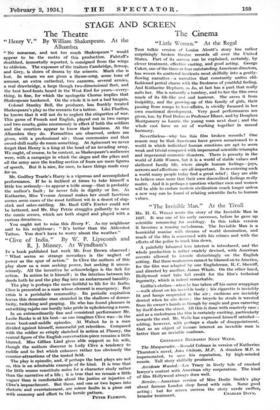"Clive of India." By W. P. Lipscomb and R. J.
Miring. At Wyndham's
IN a book published last week Mr. Ivor Brown observed : "What seems so strange nowadays is the neglect of power as the spur of action." In Clive the authors of this play show us a man seeking power, but seeking it uncon- sciously. All the incentive he acknowledges is the itch for action. In action he is himself ; in the interims between his deeds both he and the play flag into an embarrassed banality.
The play is perhaps the more faithful to life for its faults.
Clive is presented as a man whose element is emergency. But crisis is a perishable commodity. Its periodic expiration leaves this demoniac man stranded in the shallows of domes- ticity, twitching and gasping. He who has found pleasure in outwitting rajahs can hardly take pride in upholstering a room.
In an extraordinarily fine and consistent performance Mr. Leslie Banks is at his best—as one imagines Clive was—in the more boot-and-saddle episodes. At Walcot he is a man divided against himself, remorseful yet relentless. Compared with the soldier so crisply sketched in action at Plassey, the central figure of the English conversation-piece remains a little blurred. Miss Gillian Lind gives able support as his wife, though the authors discover in Lady Clive a tendency to coddle and to fret which enhances rather too obviously the counter-attractions of the tented field.
• The play is episodic, and, if perhaps the best plays are not so, this is an admirable example- of its kind. It is true that the littIe scenes constitute notes for a character study rather than the narrative of a Life; it is true that we remain a little Vaguer than is comfortable about the justice or injustice of Clive's impeachment. But these, and one or two lapses into rhetoric-. and overstatement, .are minor faults in a piece cut
With economy and effect to the heroic pattern. -- • • PETER FLEMING.








































 Previous page
Previous page